When will Apple Intelligence release in UK? With iOS 18.2 finalised, this is what iPhone users must know
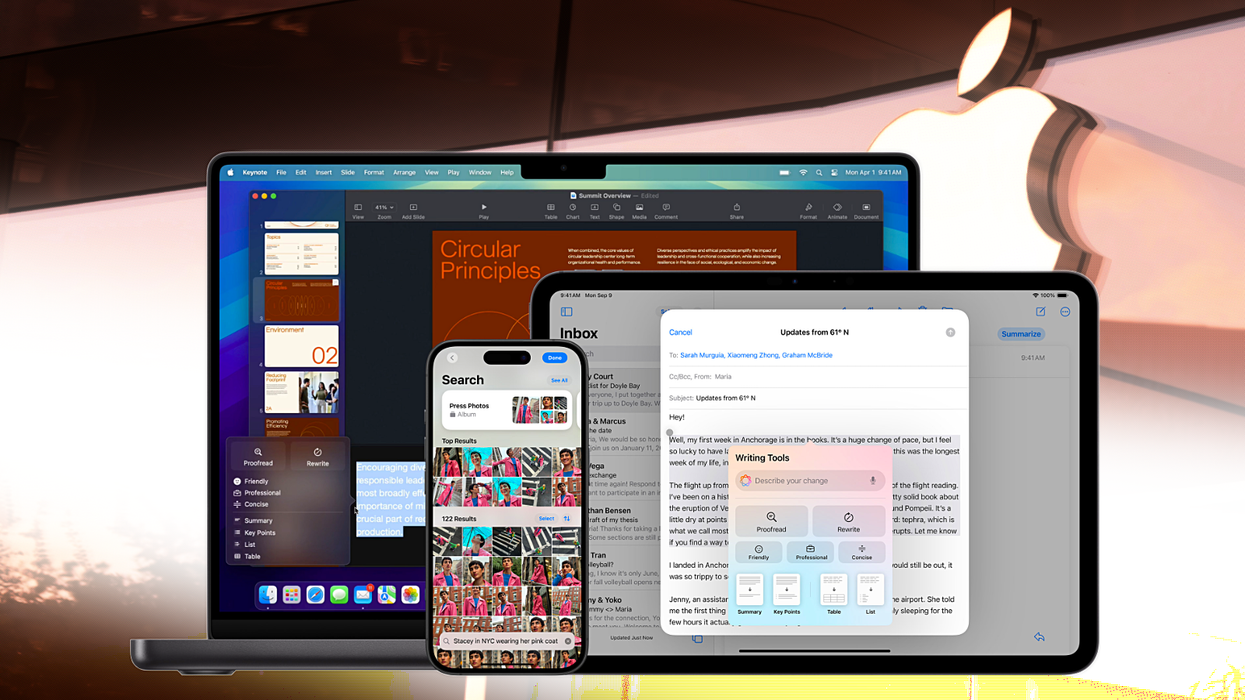
Apple Intelligence released in the United States on October 28, but will roll-out to millions of iPhone, iPad, and Mac users across the UK, Australia, Canada, Ireland, New Zealand, and South Africa in December
|APPLE PRESS OFFICE | UNSPLASH | GBN

Whispers suggest we could be days away from Apple Intelligence arriving in Blighty
- Apple has build its own AI models, known as Apple Intelligence
- This unlocks a number of new tricks across iPhone, iPad, and Mac
- Apple Intelligence can rewrite and proofread emails, texts, and essays
- With a short written prompt, it can generate entirely new emoji
- Apple Intelligence can create summarises from lengthy email chains
- It can also remove unwanted people from the background of photos
- Siri can tap into these new Apple Intelligence smarts to become more useful
- When Siri can't handle a request, it can beam a request to ChatGPT
Don't Miss
Most Read
Apple Intelligence will be released in the UK this month.
Whispers from inside the secretive firm point to a launch date of December 9 for iOS 18.2, which marks the long-awaited arrival of Apple Intelligence features, including Image Playground, Genmoji, Visual Intelligence, and deep ChatGPT integration throughout the operating system, which have previously only been available to US users.
iPhone, iPad, and Mac users in the United States have been able to access many of these features since October 28.

With the arrival of iOS 18.2, iPadOS 18.2, and macOS Sequoia 15.2, a new standalone app called Image Playground will be installed that lets you generate never-before-seen images to use in presentations, website design, text messages, emails, and more. These can be entirely-new or based on existing photos and people
|APPLE PRESS OFFICE
Apple Intelligence is a completely free upgrade, but it's only available on specific iPhone, iPad and Mac models equipped with some of the latest processors. This is because, wherever possible, Apple Intelligence tasks will be crunched on-device by the dedicated Neural Engine in the latest A- and M- processors — so you won't need any signal or Wi-Fi to take advantage of these new capabilities.
Compatible iPhone models for Apple Intelligence include:
- iPhone 16
- iPhone 16 Plus
- iPhone 16 Pro
- iPhone 16 Pro Max
- iPhone 15 Pro
- iPhone 15 Pro Max
Any iPad equipped with an A17 Pro, or M1 system-on-a-chip and newer will benefit from the new features. If you own a Mac, you'll need a machine with an M1 and later, which first launched back in November 2020.
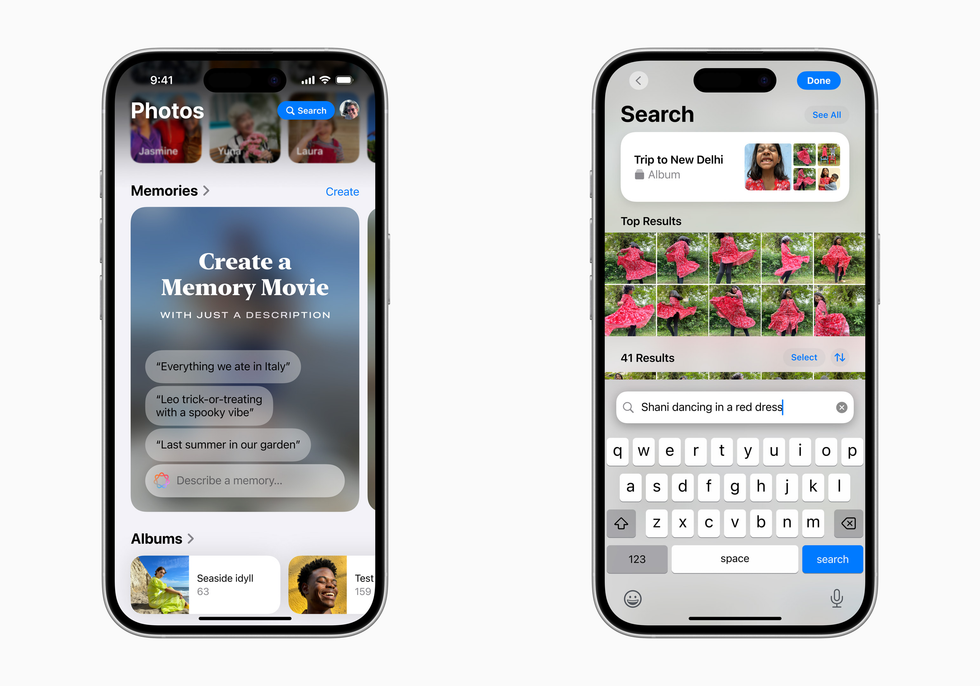
Apple Intelligence will allow users to describe their perfect short film, incorporating videos and photos, with a series of written prompts in the Photos to generate a new Memory (left) while it can also offer natural-language searches that scans every aspect of the photo to find exactly what you're looking for (right)
|APPLE PRESS OFFICE
Apple Intelligence can proofread your writing, rewrite text to alter the tone, summarise lengthy paragraphs into bullet points, and generate never-before-seen images and emoji based on your written prompts.
In stark contrast to chatbots like ChatGPT and Google Gemini, Apple promises that its solution offers a more "personal" experience. To personalise its output, Apple Intelligence can tap into information stored inside apps like Maps, Mail, and Messages.
This information will be used to add context, so if you refer to a spouse or sibling in your request, Apple Intelligence will check your contacts and other corners of iOS to determine who you're talking about.
The incoming Apple Intelligence upgrade for people across the UK is part of a broader December expansion to English-speaking countries outside the US. Apple confirmed in October that the features would become available for "localised English in Australia, Canada, Ireland, New Zealand, South Africa, and the UK" this month.
Until now, device owners living in these regions previously could only access Apple Intelligence by changing their device language to US English — and seeing the "u" vanish from "colour".

Apple CEO Tim Cook previews plans to incorporate Artificial Intelligence (AI) into a vast swathe of Apple software and hardware at the start of the Apple Worldwide Developers Conference (WWDC) on June 10, 2024 in Cupertino, California
|GETTY IMAGES
Apple first unveiled its blockbuster Artificial Intelligence (AI) system at its Worldwide Developers Conference, held in its spaceship-like headquarters in Cupertino, Califorina back in June. Its decided to take a phased approach with the roll-out of this functionality, starting with the United States of America, before rolling out in other English-speaking territories, and then launching in Chinese, French, German, Italian, Japanese, Korean, Portuguese, Spanish, Vietnamese, and other languages throughout the next year.
Apple CEO Tim Cook has described Apple Intelligence as marking "a new era" for iPhone, iPad, and Mac.
He said: "Apple Intelligence builds on years of innovation in AI and machine learning to put Apple's generative models at the core of our devices, giving our users a personal intelligence system that is easy to use — all while protecting their privacy."
The executive stressed that Apple Intelligence represents "AI as only Apple can deliver it," highlighting the Californian company's intense focus on privacy.
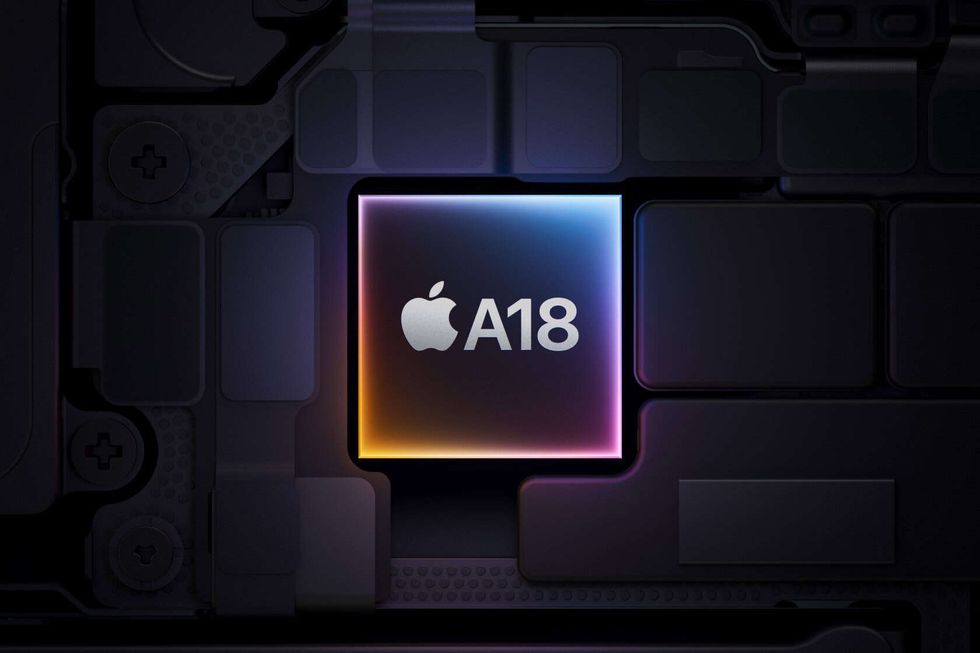
With its emphasis on local on-device processing, Apple Intelligence is limited to the latest — and most powerful — iPhone models
|APPLE PRESS OFFICE
Apple says that processing many Apple Intelligence requests on-device improves privacy — since no data ever leaves your gadget. For requests that require more processing power than is currently possible from a single chipset, Apple has developed a new server-based solution, dubbed Private Cloud Compute.
This technology replicates the same privacy protections used on-devices to the cloud. Data beamed to the cloud for a specific request is never stored or shared with Apple. The servers in-operation to handle Apple Private Cloud Compute requests are powered by custom-designed silicon from Apple, with the same safeguards and features as the smaller chipsets found inside the latest iPhone, iPad, and Mac hardware.
Even better, you don't need to take Apple's word on any of this.
In an industry first, Apple is allowing independent experts to pore-over the code running on the servers that crunch through users' Private Cloud Compute requests to verify its privacy promises. And to incentivise experts to drill-down into its work and check everything about Private Cloud Compute, Apple is offering up to $1 million in bug bounties to anyone who discovers something awry.
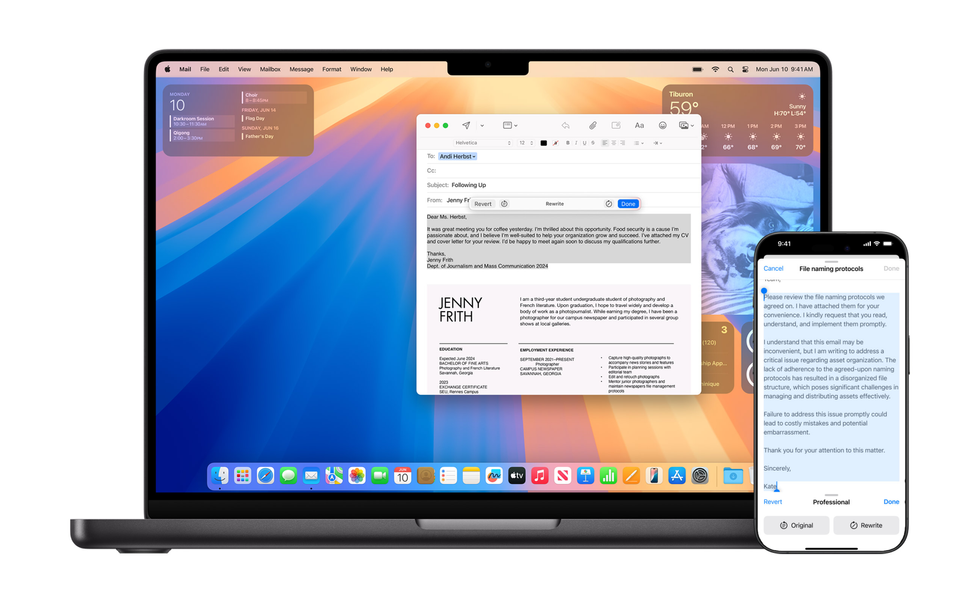
Writing Tools, powered by Apple Intelligence, are baked into the operating system and available almost anywhere there's a blinking cursor, including social media, email, and word processors
|APPLE PRESS OFFICE
What Can Apple Intelligence Do?
Apple has developed a number of AI models under the Apple Intelligence banner to enable new functionality across its iPhone, iPad, and Mac.
Some of these tricks are accessed via new applications, menus within your favourite apps, or via voice assistant Siri. These are some of the new tricks — although this list is far from exhaustive.
- New Rainbow Animation for Siri and ability to type requests
- Siri can now answer questions about the features and settings of your Apple products
- Writing Tools can proofread and rewrite your text and adjust the tone
- Suggest Smart Replies in emails and text messages
- Automatically Transcribe recordings in the Voice Memos app
- Priority Notifications will reorder notifications based on context clues
- Automatically Summarise notifications into a quick debrief
- Visual Intelligence can identify objects, animals, and locations in your camera viewfinder
- Sort thousands of emails into categories, dubbed Priority Messages in Mail
- Genmoji creates bespoke emoji characters in the Apple style from your prompt
- Image Playground dreams up new images in three styles: animation, illustration, sketch
- Search for elements within individual frames of a video in the Photos app
- Generate a new Memory in Photos with a written prompt, specifying people, location, and tone
- Remove unwanted people and objects from photos with Clean-Up
- Use ChatGPT-4o within Siri to generate new text, poetry, computer code, and more
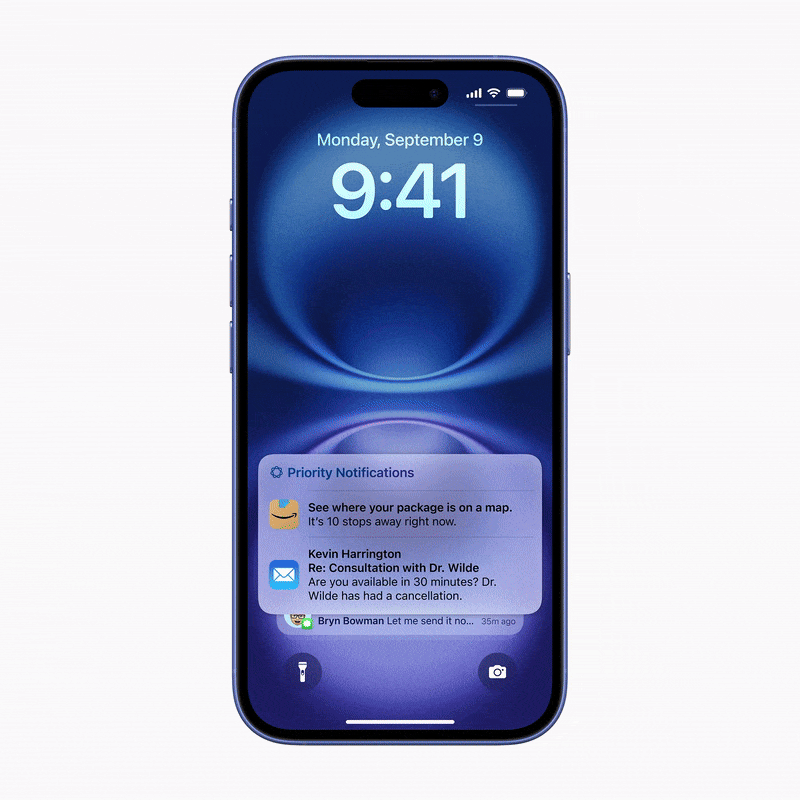 Apple Intelligence will use its AI smarts to sort your notifications based on the level of priority, with the process working in the background to assess incoming notifications all of the time | APPLE PRESS OFFICE
Apple Intelligence will use its AI smarts to sort your notifications based on the level of priority, with the process working in the background to assess incoming notifications all of the time | APPLE PRESS OFFICE With the arrival of iOS 18.2 in the UK, iPhone and iPad owners will find a new standalone installed on their device, dubbed Image Playground.
As the name suggests, this is a sandbox where you can generate stylised never-before-seen images by typing a simple text prompts, offering playful Pixar-like animation and illustration styles.
You can kickstart the process from scratch, or upload photos of friends and family members to inspire the final design. Pick from categories like themes, costumes, accessories, and places to customise the image.
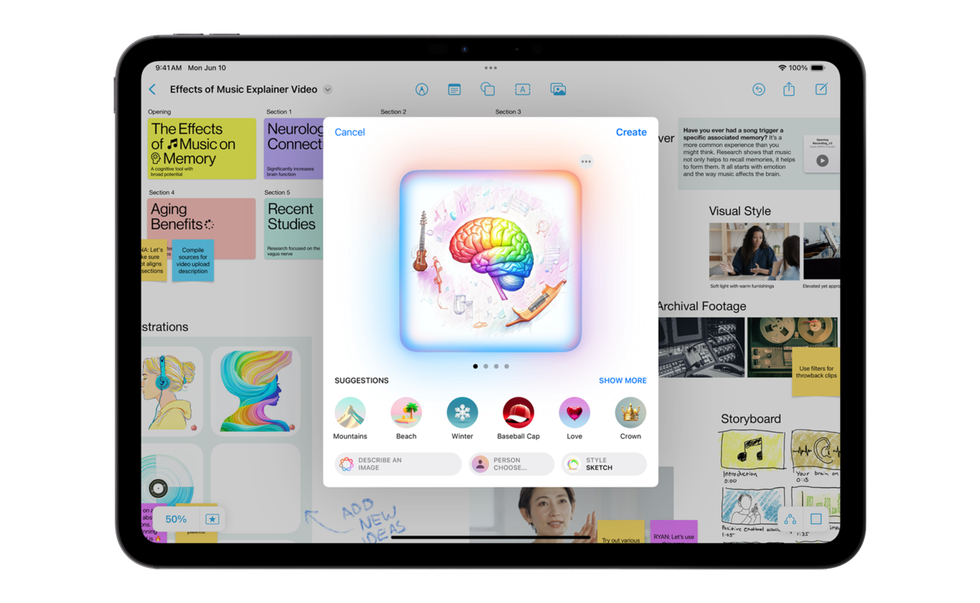
Image Playground is accessible from a number of Apple-developed apps, like Messages and Pages. Apple has also created a standalone Image Playground app to generate never-before-seen images based on your input
|APPLE PRESS OFFICE
In a similar vein, Genmoji is baked into messaging apps and lets you create custom emoji characters directly from the keyboard by describing their desired appearance or basing them on people from their photo library. These are designed to fit alongside the existing art-style of the emoji on your Apple device.
Visual Intelligence — exclusive to the iPhone 16 and 16 Pro lineup — provides real-time information about surroundings when users point their camera at objects or places. You can tap the new Camera Control button, point the camera lens at a breed of dog, tourist hotspot, or type of flower and get a swathe of information.
If you need any more detail on any of these features, the Tips app — preinstalled on all new iPhone models — has been refreshed to include a dedicated section on Apple Intelligence.
Apple has developed bespoke AI models to enable Apple Intelligence.
When asked about the data used to build these models, Apple Senior Vice President of Software Engineering Craig Federighi says that it used the "highest quality data that we can from the public web".
"We do that in a way where publishers can opt out of having their work data used in training models. In addition to that, we license news archives, textbooks, stock photography and all of that goes into these models," the Apple executive revealed in a fireside chat with John Giannandrea in the Steve Jobs Theatre.
However, there are limits to what Apple Intelligence can do — specifically when it comes to many of the creative flourishes seen in the latest ChatGPT model, such as dreaming up poetry and recipes from a brief written prompt. Rather than pour resources into replicating these capabilities, Apple will partner with other AI firms.
ChatGPT-4o is the first third-party model to be tied into iOS, macOS, and iPadOS.
Using Siri as the conduit, the partnership with OpenAI unlocks all of the usual tricks you'd expect from ChatGPT, including the ability to dream up new recipes from a list of ingredients, travel itineraries, job interview questions, essays, and much more.
You can also send photographs to provide extra context for ChatGPT.
Siri will always warn you before it sends anything to ChatGPT-4o. As part of the agreement, iPhone owners won't need to set up an account with OpenAI and no request sent from Siri will be logged — something that controversial billionaire Elon Musk seemed to misunderstand ahead of launch.
IP addresses will also be obscured from OpenAI, although as you'd expect, those who choose to connect their existing accounts will be subject to OpenAI's data-use policies. All processing is handled through encrypted communications between devices and Apple's servers.
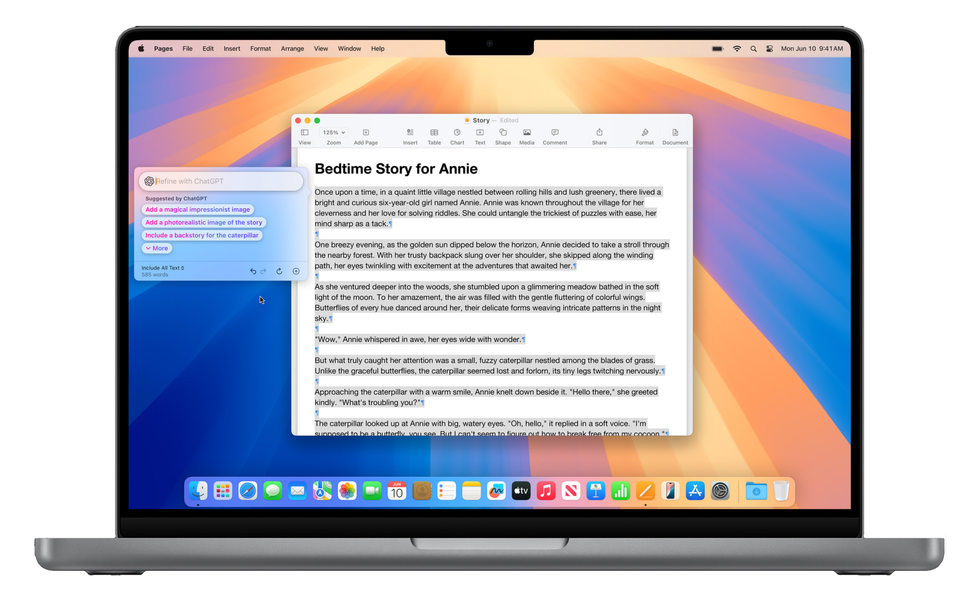
If Apple Intelligence can't handle a particular request, Siri can send it to ChatGPT to process
|APPLE PRESS OFFICE
Speaking about the possibilities of Apple Intelligence, Craig Federighi said: "This is AI for the rest of us. Personal intelligence you can rely on at work, home and everywhere in between.
"This is the beginning of an exciting new chapter of personal intelligence. Intelligence built for your most personal products: your iPhone, iPad and Mac. Intelligence grounded in the things that make you, you and intelligence available to you system-wide so that you can get things down in a way that works for you.
“We are just getting started and I hope you are as excited as I am for the road ahead.”
 Upgraded new Siri voice assistant also arrives with a colourful new animation spinning around the border of the handset, letting you know when it's ready to take action for you | APPLE PRESS OFFICE
Upgraded new Siri voice assistant also arrives with a colourful new animation spinning around the border of the handset, letting you know when it's ready to take action for you | APPLE PRESS OFFICE Looking ahead, Apple Intelligence provide the backbone of a supercharged new version of Siri.
The virtual assistant, which has been baked into every iPhone since October 2011, will soon be able to adjust system settings, pull together information from multiple apps to answer a request, and perform actions inside iOS apps. Instead of constantly jumping between apps, the all-new Siri promises to tie everything together.\
LATEST DEVELOPMENTS
- Vision Pro could change photos forever, and iPhone owners prepare now
- Your Freely TV will soon support GB News
- Best Sky Stream deals
- Apple updates MacBook Air with one small change that'll save you £200
- Best VPN deals
- Virgin Media shakes up annual broadband price rises for millions
For example, if you're looking at a photograph, you can ask Siri "add this to my note about Dad's Birthday". Apple Intelligence uses context from data on your iPhone to identify who you're referring to as well as the relevant note in your Notes app. And then, Siri will paste the photo in the right place.
If you're unsure whether you added that appointment you were discussing in Messages to your calendar, Siri can scour conversation history and information in other apps to find what you need.
There's no firm release date on this next-generation iteration of Siri, but we'd expect to see many of these features roll-out in the new year.










